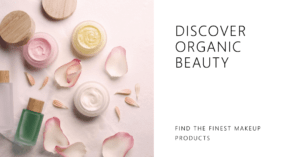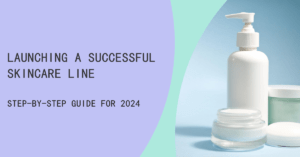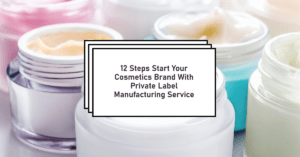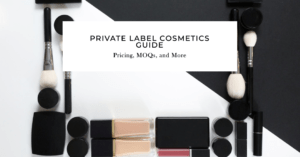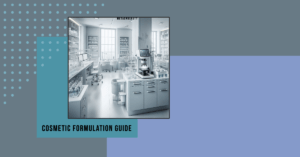How to Start A Private Label Cosmetics Brand: A Comprehensive Guide
Starting a private label cosmetics brand can be an exciting and lucrative venture. With the beauty industry booming and consumers constantly seeking new and innovative products, now is a great time to delve into this business. Whether you’re a makeup enthusiast, an entrepreneur, or simply someone looking to explore a new business avenue, this guide will walk you through the essential steps to kickstart your private label cosmetics brand.

Table of Contents
1. Understanding What Is Private Label Cosmetics
Private label cosmetics, often referred to as white-label or store-brand cosmetics, have surged in popularity over the past decade. These products, manufactured by one company and branded by another, offer businesses the opportunity to create unique product lines without the need for in-house production facilities.
2. Steps to start a private label cosmetics
1. Start A private Label Cosmetics From Market Research: Identifying Trends and Gaps
Thorough market research helps you identify popular trends and gaps in the cosmetics industry. This insight enables you to tailor your product line to meet consumer demands effectively.
In the ever-evolving landscape of the beauty industry, private label cosmetics have emerged as a significant player, transforming the way consumers perceive and purchase beauty products. As consumer preferences shift and new technologies emerge, market research becomes a crucial tool for businesses to identify trends and bridge gaps in the private label cosmetics sector.
The Rise of Private Label Cosmetics
The private label cosmetics market has witnessed remarkable growth due to its flexibility and cost-effectiveness. Retailers and individual entrepreneurs can now enter the beauty market with their branded products, allowing for increased competition and diversity.
Understanding Market Research in the Beauty Industry
Market research serves as a compass for navigating the competitive beauty industry. It involves the systematic collection and analysis of data to identify emerging trends and consumer preferences, enabling businesses to make informed decisions.
Importance of Identifying Trends
Recognizing trends early gives businesses a competitive edge. Market research helps spot shifts in consumer behavior, enabling companies to adapt their product offerings swiftly and stay relevant in the fast-paced beauty landscape.
Bridging the Gaps in Private Label Cosmetics
Market research doesn’t just identify trends; it also helps identify gaps in the market. These gaps could be unmet consumer needs or underserved segments, presenting lucrative opportunities for private label cosmetics businesses to fill.
Technology’s Role in Shaping Trends
Technology, such as augmented reality (AR) beauty apps and online skin analysis tools, is revolutionizing how consumers experience cosmetics. Market research helps brands stay ahead by integrating these technologies into their offerings.
Sustainability and Ethical Practices
With the growing concern for the environment, consumers are leaning towards sustainable and ethically produced cosmetics. Market research sheds light on these preferences, prompting private label brands to embrace eco-friendly practices.
Navigating Regulatory Challenges
Cosmetics are subject to strict regulations. Market research aids in understanding the ever-evolving compliance landscape, ensuring that private label products meet industry standards.
Globalization and Cultural Considerations
The global reach of private label cosmetics presents both opportunities and challenges. Market research helps brands tailor their products to diverse cultural preferences while expanding their international footprint.
The Impact of Social Media
In the digital age, social media platforms wield immense influence over beauty trends. Market research helps brands collaborate with influencers and leverage social media to amplify their products’ reach.
Personalization: A New Frontier
Consumers seek personalized experiences. Market research allows private label cosmetic brands to create products that resonate with individual preferences, fostering customer loyalty.
Challenges in Supply Chain and Logistics
Efficient supply chain management is pivotal. Market research assists brands in streamlining their logistics, reducing costs, and ensuring timely delivery of products.
Forecasting Future Trends
Market research isn’t just about the present; it’s also about anticipating future trends. By analyzing data, private label cosmetic businesses can position themselves as trendsetters.
2. Start A private Label Cosmetics From Creating Your Unique Selling Proposition (USP)
Develop a compelling USP that sets your brand apart from the competition. Whether it’s cruelty-free ingredients, innovative formulations, or eco-friendly packaging, your USP will attract a loyal customer base.
3. Start A private Label Cosmetics From Selecting Your Product Line
By partnering with a private label cosmetics company, you can create your unique line of beauty products without the need to formulate them from scratch
Identifying Your Niche and Target Audience
Before diving into the plethora of products available, define your niche. Are you leaning towards skincare, makeup, haircare, or something else? Identify your target audience’s preferences, needs, and demographics.
Researching Current Market Trends
Stay updated with the latest cosmetic trends. This ensures that your product line remains relevant and appealing to your target market. Incorporate trending ingredients and formulations where possible.
Assessing Product Quality and Ingredients
Quality is paramount. Choose a private label cosmetics company that uses high-quality ingredients. This factor not only affects the effectiveness of your products but also your brand’s reputation.
Customization and Branding Options
Look for a private label partner that allows product customization. Your brand’s unique twist on the products will set you apart from competitors.
Packaging and Design Considerations
Attractive packaging grabs attention. The private label company should offer various packaging options to align with your brand’s identity.
Pricing and Profit Margins
Calculate the costs involved and set a pricing strategy that ensures both profit margins and affordability for your customers.
Minimum Order Quantities (MOQs) and Inventory Management
Understand the MOQs the private label company requires. Balancing demand and supply is crucial to avoid excess inventory or stockouts.
Requesting Samples
Always request samples before committing to a full order. This allows you to assess product quality and make necessary adjustments.
Reviewing Legal and Regulatory Aspects
Cosmetic products are subject to regulations. Ensure the private label company complies with these regulations to prevent legal complications.
Collaborative Partnership with the Private Label Company
Build a strong relationship with your private label partner. Effective communication ensures your product line aligns with your vision.
Placing Your First Order
Once you’re satisfied with samples and terms, place your first order. Start with a manageable quantity to test the market’s response.
4. Start A private Label Cosmetics From Choosing Reliable Suppliers and Manufacturers
In the world of cosmetics, where quality and safety are paramount, finding reliable suppliers and manufacturers is crucial. Whether you’re launching your own skincare line, makeup brand, or beauty products, partnering with trustworthy suppliers ensures that your products meet high standards and reach the market on time. you may interested in Top Cosmetic Private Label Companies In 2023: Your Ultimate Guide to the Industry Leaders to find your reliable cosmetic manufactures.

MetaCNBeauty The Best Private Label Cosmetics Factory In China
Understanding the Importance of Reliable Suppliers
Reliable suppliers play a pivotal role in maintaining the integrity of your brand. They contribute to product quality, consistency, and timely delivery. Choosing the right suppliers minimizes risks related to subpar products or supply chain disruptions.
Defining Your Requirements
Before embarking on the supplier selection process, clearly define your requirements. Consider factors such as product type, quantity, quality standards, packaging, and delivery timelines.
Researching Potential Suppliers
Conduct thorough research to identify potential suppliers. Leverage online directories, industry events, and trade associations to create a list of candidates that align with your needs.
Evaluating Supplier Credibility
Check the credibility and reputation of potential suppliers. Look for reviews, testimonials, and certifications. A supplier with a solid track record is more likely to meet your expectations.
Assessing Product Quality
Quality is non-negotiable in cosmetics. Request product samples to assess quality firsthand. Ensure that the supplier maintains consistency in their products over time.
Ensuring Regulatory Compliance
Cosmetics are subject to strict regulations. Ensure that your chosen supplier follows all relevant regulations and possesses necessary certifications for safe and legal products.
Communication and Responsiveness
Effective communication is key to a successful partnership. Gauge the supplier’s responsiveness and willingness to address your concerns promptly.
Scalability and Capacity
Consider your brand’s growth trajectory. Partner with suppliers who can accommodate your increasing demands without compromising quality.
Sampling and Prototyping
Before large-scale production, request prototypes and samples. This step helps you identify any potential issues and make necessary adjustments. Get your free samples now.
Considering Ethical and Sustainable Practices
Consumers value ethical and sustainable practices. Choose suppliers who prioritize eco-friendly production methods, ingredient sourcing, and packaging.
Negotiating Terms and Pricing
Negotiate terms, pricing, and payment schedules. Be transparent about your budget while aiming for a mutually beneficial agreement.
Contract Agreements
Formalize your partnership with a comprehensive contract. Outline expectations, quality standards, delivery schedules, and dispute resolution mechanisms.
Managing Supply Chain Risks
Identify potential risks in the supply chain and develop contingency plans. This preparation minimizes disruptions caused by unforeseen events.
Building Long-term Partnerships
Long-term partnerships are advantageous for both parties. Cultivate a collaborative relationship with open communication and regular performance reviews.
5. Start A private Label Cosmetics From Designing Your Brand and Packaging
Create an eye-catching brand logo and packaging that resonates with your target audience. The packaging should reflect your brand’s values and the essence of your products.
6. Start A private Label Cosmetics From Quality Control and Testing
Prioritize quality control and product testing to ensure the safety and efficacy of your cosmetics. Conduct necessary tests and certifications to meet regulatory requirements.
7. Start A private Label Cosmetics From Setting the Right Price Points
Determine competitive yet profitable price points for your products. Consider factors like production costs, market positioning, and perceived value.
8. Start A private Label Cosmetics From Building Your Online Presence
Create a user-friendly website and leverage social media platforms to showcase your products. Engage with your audience through informative and visually appealing content.
9. Start A private Label Cosmetics From Launching and Promoting Your Brand
Plan a strategic launch that creates buzz around your brand. Utilize influencer partnerships, giveaways, and online promotions to generate interest and sales.
10. Start A private Label Cosmetics From Managing Orders and Inventory
Implement an efficient order and inventory management system. This ensures timely order fulfillment and prevents stockouts or overstocking issues.
11. Start A private Label Cosmetics From Gathering and Using Customer Feedback
Encourage customer feedback and reviews to improve your products and customer experience. Make necessary adjustments based on valuable insights.
12. Start A private Label Cosmetics From Scaling Your Business
As your brand gains traction, consider expanding your product range and reaching new markets. Scaling requires careful planning and resource allocation.
13. Start A private Label Cosmetics From Staying Compliant with Regulations
Starting a private label cosmetics business can be an exciting venture, allowing you to tap into the beauty and skincare industry. However, amidst the creative process of developing products, it’s crucial to maintain strict compliance with regulations.
Private label cosmetics have gained significant popularity due to their potential for customization and branding. However, creating and selling cosmetics comes with responsibilities, primarily related to the safety and well-being of consumers.
Importance of Compliance
Start A Private Label Cosmetics Business Compliance with regulations is non-negotiable when dealing with cosmetics. Straying from these regulations can lead to legal issues, reputation damage, and even health risks to consumers.
Navigating FDA Regulations
The U.S. Food and Drug Administration (FDA) has specific regulations for cosmetics. While cosmetics don’t require FDA approval before entering the market, they must be safe for use and properly labeled. Familiarize yourself with these regulations to ensure full compliance.
Labeling Requirements
Cosmetic labeling is more than just aesthetics; it’s a legal requirement. Your product labels must include a list of ingredients, usage instructions, and manufacturer information. Clear and accurate labeling helps consumers make informed decisions.
Product Testing and Safety
Conducting safety tests on your cosmetics is crucial. These tests assess potential skin reactions, toxicity, and stability. Prioritize consumer safety by only offering products that have passed rigorous testing.
Good Manufacturing Practices (GMP)
Following GMP ensures your cosmetics are manufactured under controlled conditions, minimizing the risk of contamination or product defects. Implementing GMP guidelines is essential for maintaining product consistency and safety.
Documentation and Record-Keeping
Maintain thorough documentation of your product development, manufacturing processes, and safety tests. These records not only help in case of audits but also demonstrate your commitment to compliance.
International Regulations
If you plan to expand globally, research and adhere to international cosmetics regulations. Different countries may have varying requirements, and failure to comply could hinder your international growth.
Environmental Considerations
Cosmetic packaging and ingredients can have environmental impacts. Opt for sustainable packaging and source eco-friendly ingredients whenever possible. This not only aligns with consumer values but also contributes to a greener planet.
Marketing and Claims
Avoid making unverified claims about your products. Misleading marketing can lead to legal troubles. Be honest about your product’s benefits and ingredients.
Employee Training
If you have employees, ensure they are well-versed in compliance measures. Their understanding of regulations contributes to the overall integrity of your business.
Monitoring and Adapting to Changes
Regulations can change over time. Stay informed about the latest updates and be ready to adjust your products and practices accordingly.
Building Consumer Trust
Compliance is a cornerstone of consumer trust. When customers know your products are safe and adhere to regulations, they’re more likely to become repeat buyers and brand advocates.
14. Start A private Label Cosmetics From Nurturing Customer Loyalty
Build lasting relationships with your customers through loyalty programs, personalized offers, and exceptional customer service. Loyal customers can become brand advocates.
Conclusion
Embarking on the journey of start a private label cosmetics brand requires dedication, creativity, and a solid business strategy. By following the steps outlined in this guide, you’ll be well-equipped to navigate the dynamic beauty industry and create a brand that resonates with consumers.
Start a private label cosmetics with MetaCNBeauty cosmetic private label manufactures now
FAQs
1. Is prior experience in the cosmetics industry necessary to start a private label cosmetics or cosmetic brands?
Not necessarily, but a passion for cosmetics and a willingness to learn are essential.
2. How do I find reliable manufacturers for my cosmetics line?
Research online, attend industry events and ask for recommendations within your network.or check out the Top Cosmetic Private Label Companies In 2023
3. What marketing strategies work best for promoting private label cosmetics?
Social media marketing, influencer collaborations, and content marketing can be highly effective.
4. Are natural and organic ingredients a must for private label cosmetics?
It depends on your target audience; some customers prioritize these features, while others may not.
5. How long does it take to see significant profits from a private label cosmetics brand?
Profit timelines vary, but with consistent effort, branding, and marketing, you can expect positive results within a year or two.

